Which game has the best magic?
Sit for a spell as we figure out which game's magic system is the most interesting and satisfying.
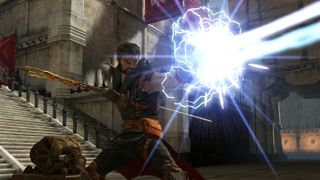
Find all previous editions of the PCG Q&A here. Some highlights:
- How do you hold a controller?
- What's the first game you remember finishing?
- What's your favorite podcast game?
Crackling lightning bolts, searing flames, immobilizing ice, and the warm green glow of a healing spell... no matter what form it takes, we love using magic in games.
In real life, fire doesn't shoot from our fingertips, we can't turn ourselves invisible, and instead of levitating we have to climb a ladder or ask someone to pick us up and carry us around. Real life pretty much sucks!
But which game has the best magic? That's our question this week, and we've got our answers below along with some from the members of the PC Gamer forums. Cast your opinions in the comments.
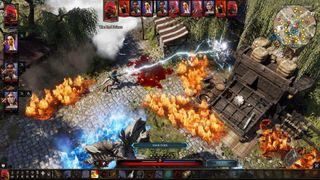
Jacob Ridley: Divinity: Original Sin 2
Divinity makes you work for every victory—most of all when it comes to finding the perfect blend of magic and skills that can topple your opponent's armour or render them useless against you. Every battle makes you think of how you might be able to use your spells in new and exciting ways: blessings and curses going backwards and forwards—much to the chagrin of my poor CPU that had to compute every instance—extinguishing fires with rain spells, flying away from danger at the last moment, turning people into chickens. Actually it might be time for another playthrough...
Morgan Park: Noita
That game is messed up. Similar to Divinity, Noita asks you to consider the elemental effects that your spells have on the world around you. A simple firebolt flung in the wrong direction could set a tangle of vines ablaze, which drops embers to the wood planks beneath, eventually spreading to a nearby vat of oil that burns and creates so much smoke in the room that you suffocate and die. It's sort of like Spelunky, but if every weapon was as potentially volatile as the bomb. I haven't played its last few updates, but I keep it installed because I'm constantly in the state of almost launching it. It's rad.
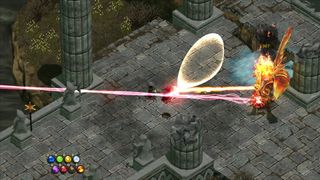
Jody Macgregor: Magicka
PC Gamer Newsletter
Sign up to get the best content of the week, and great gaming deals, as picked by the editors.
Magicka lets you combine eight elements (like fire, earth, lightning, and shield) as well as designate a target (yourself, somebody else, your sword) and then cast. It's deliberately overcomplicated, the elements spread over your keyboard, because Magicka is a game of co-op chaos where the friendly-fireball option is always on. You go to cast an ice spell on a troll and freeze your ally as well, you bring down chain lightning and it routes through that one wizard who just had to be standing in the water, you bring up a shield bubble as someone else is firing off an arcane bolt that will now rebound and kill them. Every level is like the scene in a Discworld book where the wizards remember they can do magic then march off to sort things out, and pretty soon the Archchancellor's hat is on fire and the Bursar's been turned to stone.
Phil Savage: Oblivion
I will always appreciate how Elder Scrolls games like Morrowind and Oblivion allowed—even encouraged—you to use the flexibility of magic to essentially break the game. Oblivion's enchantment system is absurd in the best way. I spent a long time save scumming Oblivion Gates in search of Transcendent Sigil Stones with the 30% Chameleon effect. Get enough to hit 100% and you've got full, permanent invisibility on that armour. This fully ruins the game, as no enemies can attack you—but those games felt dedicated to emergent player behavior in a way few RPGs ever are. Skyrim dialled back the absurdity, and it's a poorer game for it.
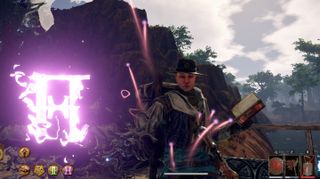
Chris Livingston: Outward
I've sung its praises a few times already, but I'm a big fan of Outward's magic system (and Outward in general). A lot of fantasy games will simply give you a basic fireball spell for being a level one magic-user, but Outward is as much survival as it is fantasy, and just elevating yourself to 'basic' takes work. There's a quest to reach the center of a mountain, which is nothing to sneeze at in Outward's dangerous world. You then have to choose how much of your physical health and stamina to sacrifice to gain mana—investing in magic means diminishing yourself physically. Then, you're given a Spark spell, which is basically a weenie fireball—good for lighting campfires but nearly useless in combat. Welcome to magic!
For Spark to be any good, you'll need to couple it with another spell, Sigil of Fire, which gives you a magic circle to stand in. Casting Spark from inside the circle gives you a proper fireball, but step outside the circle and you're back to flinging lit matches again. To cast Sigil of Fire, you'll need a Fire Stone, which you'll find or craft first, meaning you're never going to be spamming magic like it's an inexhaustible resource. Oh, and just standing inside the Sigil of Fire will raise your body temperature, which isn't great if you're already baking to death in the desert. Very little about Outward's magic system is simple, which is what makes it so great.
Andy Kelly: Final Fantasy 8
Look, I'm not saying FF8's junction system is the best, but I've always found it interesting. It lets you attach various types of magic to your characters to improve and alter their stats. Junction 100 fire magic to Squall's attack, for example, and you'll get a big melee boost, as well as causing additional fire damage. But the more fire spells you use from your stockpile, the weaker these effects will be. It was a fun balancing act, deciding whether to use spells or keep the stat increase. It was possible to exploit the system and make your party massively overpowered, but considering some of the later battles in FF8, I wasn't complaining.
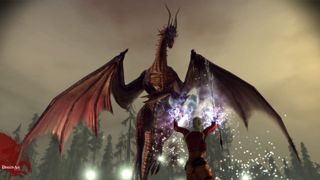
Tom Senior: Dragon Age: Origins
Sometimes magic can just feel like a different type of gun in games—think of the rapid fire staffs of Hexen. But I much prefer games that treat magic with care and respect, acknowledging it as a destructive force that warps reality in dangerous ways. The Dragon Age series has always recognised this. It's a vital part of the series' plot. Mages are feared and distrusted because of their abilities. In Origins this perspective carries through to the game's combat mechanics. Friendly fire is a serious concern when you're placing a big fire spell template. Your mage can immolate your own party as well as the enemy using the game's most powerful spells. Both narratively and in combat, magic is a serious force that must be used with great care.
Andy Chalk: Arx Fatalis
Arx has a really unusual magic system in which you draw geometric "runes" with your mouse in a particular order to achieve different effects. It's very tactile and cool—when you're quietly casting an AAM YOK to light a torch, at least. It's a different situation when you're desperately trying to chuck a fireball at an angry lich, which requires you to stop, face the lich, enter spellcasting mode, draw three shapes on your screen with sufficient accuracy that the game will recognize what you're trying to do, and then turn around and haul ass, all while this goddamn undead murder machine is bearing down on you at speed. It's possible to queue up to three spells in advance for instant use, but that's not super-helpful without knowing what's waiting around the next corner—and you better not miss.
I know that sounds like a stretch of the word "best," but it's such an unusual approach to immersion and power limitation (and such a great dungeon crawler) that I've always had genuine affection for it.
From our forum
Alm: I remember Hexen being Doom but with magic, and I loved it for that. Even though I don't think it was that spectacular. As for doing magic really well, Div Sin had a great magic physics engine. And jedi knight was great if force abilities can count as magic.
Krud: I usually steer clear of magic-using characters in games for some reason. Or rather, I'll use magic in passing, but it's rarely my main thing. Having said that, I always really liked the story elements of the magic system in the Dragon Age series. (It's also the one game where I started out with a Mage.) I don't know that it's necessarily the best magic "system", but I really liked the mythos with the blood magic, The Fade, and how it all relates with Templars, Priests, dwarven Enchanters and the Tranquil.
Sarafan: At first Baldur's Gate series came to my mind. But that's not a good example. BG is based on D&D and there are other games which use a similar magic system. One of the most innovative magic system you can find in Arx Fatalis. Pushing a key or two is not sufficient to cast a spell in this game. You have to do proper mouse gestures based on collected runes. So no spell spamming. The player needs some commitment and effort to become a proficient caster in Arx Fatalis. The mouse gestures make this system one of the best that I've seen in a computer game. It's demanding, but very rewarding and fun!
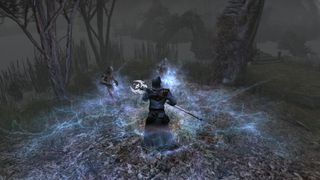
Pifanjr: A few games come to mind:
Magicka: creating different effects by using different combinations of elements is a genius idea and one that worked exceptionally well. Especially with the possibility of casting so called "magicks" by using specific combinations for unique spells. Two Worlds II uses a card system that allowed you to create your own spells by combining elements and modifiers. The game had its problems, but I absolutely loved the magic system. Path of Exile also let's you use modifiers to add or change effects and uses this for all skills, not just magic.
Black & White is completely different, but has a lot of fun miracles you can cast, most of them having upgraded versions. The game also includes a lot of fun details, like using gestures as shortcuts to select miracles and being able to find one shot miracles by paying attention to the fireflies at sunrise. But most importantly, you can teach all the miracles to your loyal creature to use against anyone standing in your way.
Zloth: City of Heroes/Villains. Each power set had a nice selection but what really made it fun was the ability to modify each power with enhancers, which let you make the power cheaper to use, more likely to hit, do more damage, recycle faster, affect enemies for longer, heal more damage and so on. That let you customize your powers so that one blaster's electric bolt wouldn't necessarily play like another's. Also, you got to set the colors the particle effects used in your powers. It sounds so simple but being able to change colors to work well with your characters' color schemes really does help a lot.
(OK, so it's actually a "power" system, but if you picked the magic origin then they were spells! I submit to the Council of the Coconut Magi that it qualifies!)
XoRnB: Sometimes you don't need a complex system to appreciate excellent magic. Sure you could throw a boring old fireball or blink away from danger. But why do that when you can summon a pack of kamikaze zombie bears to maul your enemies, or call a deadly school of rabid piranhas to gnaw away their feet?
The Witch Doctor of Diablo 3 has my vote for the best magic of any game. Hex the hordes, harvest their souls, and throw a jar of spiders at them. Is a jar of spiders magic? It is if you have an infinite amount of them.
Diablo 3 throws lords of hell at you and Witch Doctor says, "I'm going to kill you with these frogs." Now THATS magic.

Chris started playing PC games in the 1980s, started writing about them in the early 2000s, and (finally) started getting paid to write about them in the late 2000s. Following a few years as a regular freelancer, PC Gamer hired him in 2014, probably so he'd stop emailing them asking for more work. Chris has a love-hate relationship with survival games and an unhealthy fascination with the inner lives of NPCs. He's also a fan of offbeat simulation games, mods, and ignoring storylines in RPGs so he can make up his own.
Most Popular


